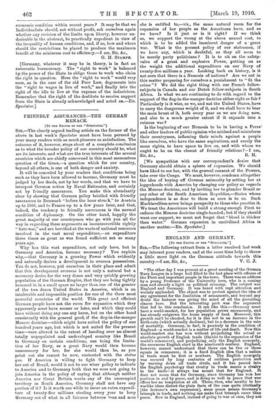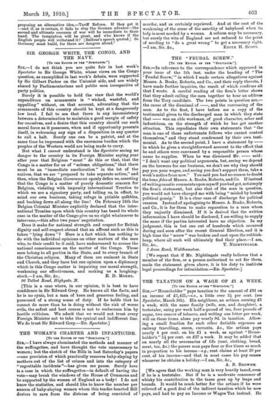ENGLAND AND GERMANY.
[To THE EDITOR OP TRY "SPECTATOR.'
Sra,—The following extract from a letter received last week may interest your readers, and at the same time help to throw a little more light on the German attitude towards this
"The other day I was present at a great meeting of the German Navy League in a large hall filled to the last place with officers of the Fleet and important people in the town. There was an address by a young Professor of the University here, who is a coming man and already a light on political economy. The subject was England and Germany. It was heard with rapt attention and warmly applauded. The object was to protest against the idea of any agreement for the limitation of armaments, and beyond any doubt the lecturer was giving the mind of all the prevailing classes here. But the interesting part was the argument that led to this conclusion. It ran like this :--Germany must have a world-market, for her population grows enormously, and has already outgrown the home supply of food. Moreover, this growth can't be checked, for it is due not to an increase in the birth-rate (which actually declines), but to a decrease in the rate of mortality. Germany, in fact, is precisely in the condition of England—a world-market is a matter of life and death. Now this world-market she has won without prejudicing the actual or absolute growth of English trade (thanks to the expansion of the world's commerce), and prejudicing only the English monopoly, the enormous English start in the nineteenth century. England, however, cannot understand that there can be two or three equals in commerce; it is a fixed English idea that a nation in trade must be first or nowhere. The English monopoly was secured by long centuries of ruthless protection and by warring down all trade rivals, and it has passed into the English psychology that rivalry in trade means a rivalry to the knife—it always has meant that for England. It does not mean that for Germany, since, Germany has won her position in and by peace, and is doing so well in peace that war offers her no temptation at all. Those, then, who ascribe to her warlike ideas distort the plain facts of the case quite idiotically [the lecturer's own expression], since peace means Germany's triumph in trade, and nothing can make that triumph surer than peace. Now in England, instead of going to war at once, they are
proposing an alternative idea,—Tariff Reform. If they get it —and if, as is certain, it fails to stay the German advance--the second and ultimate resource of war will be immediate to their hand. The temptation will be great, and who knows if the English people will withstand it? [Balfour's speech quoted.] So Germany must build, for there are dangers ahead."











































 Previous page
Previous page